New York Rangers: Five questions after six weeks of hockey

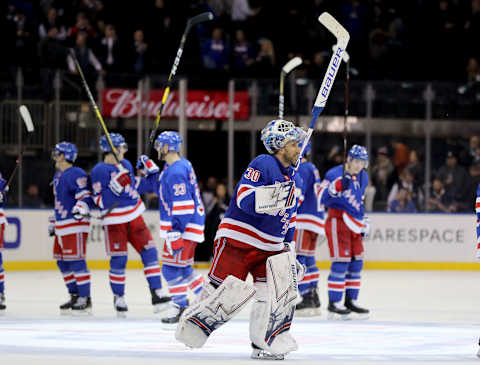
The New York Rangers have rallied back from a weak start but after six weeks have raised a series of questions.
After coming out of the gate about as poorly as possible, the New York Rangers resemble a competent hockey team. Those who called for David Quinn’s head after the team took two weeks to win its first game are still bickering amongst themselves about his lineup decisions even though it’s winning now.
With 18 games under their belts, the Rangers’ players have started to figure out who they are as a team. Although the group is not the most talented in the league, its own internal growth is fueling the team on a nightly basis. This is a case in which the team is playing above its means through intangible factors.
The team exceeding expectations is a positive reflection on the coaching staff and the players in the room. While it is partly due to players performing better than they have in the past, it’s also a result of player development.
This poses a series of questions related to sustainability and luck. Just how much of the past three weeks is positive regression and how much is for real?
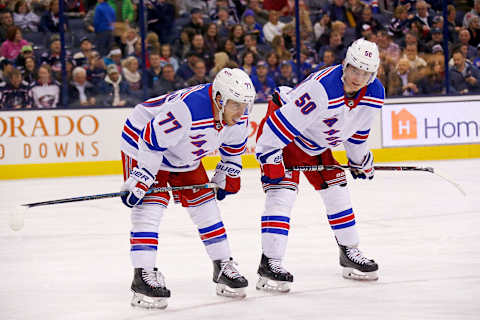
Number five: Is the defense…not the worst?
Coming into the season, the Rangers’ most glaring weakness was the defense. There’s a saying in the NFL that if a team has two quarterbacks it has no quarterbacks. New York coming into the season with eight defensemen on the active roster was a clear sign that the coaching staff and front office did not have a clear sign as to what to expect.
Even though the unit as a collective still is not exactly lighting the world on fire it’s playing well enough to get by. The biggest factor in the team’s recent success has been the stability of the defense that’s playing a certain style of hockey. In addition to the style of play, the unit has gotten partner stability allowing chemistry to form.
Throw in the fact that Tony DeAngelo is playing like a competent first pair defenseman alongside Brady Skjei and giving the unit as a whole a sense of balance. Throw in Marc Staal holding his own with Neal Pionk and Kevin Shattenkirk playing well gives the team a passable group.
With a forward group that is above average, a passable defense may just be enough to prevent the Rangers from being one of the worst teams in the entire league.
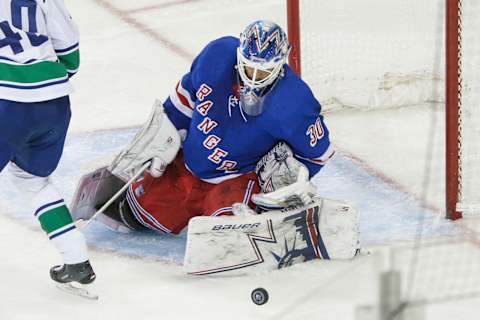
Is Henrik Lundqvist a wizard?
Although father time is undefeated in the sports world, Henrik Lundqvist has continued to play at a high level past the typical age of a professional hockey player. Although possible, it was unlikely that the Swede was going to continue to be an above replacement level goalie at age 37. But, somehow Lundqvist has continued to be the heart and soul of the Rangers.
While the defense as a whole is still suspect, the play of the Swede is good enough to keep the team afloat. Even though the team in front of Lundqvist is giving up 40 shots on goal per night, the goaltender has been up to the task. Getting above average goaltending is all any team can ask for on a nightly basis from the position and part of why the Rangers have come on as of late.
It’s crazy to think about a time in the near future without Lundqvist between the pipes but for now, he has to be enjoyed. For every ungrateful fan that bashes the goaltender, there’s an equally great Lundqvist save to watch. While Lundqvist likely needs to get less work going forward, there’s no sign of him slowing down.
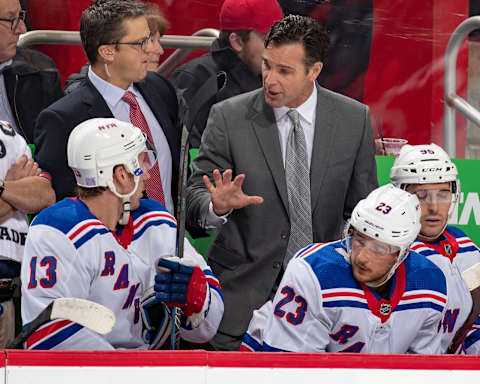
Number three: Is David Quinn getting comfortable?
Anytime someone is new to their job, there are going to be growing pains. For David Quinn, his team took five too many men on the ice penalties in the course of a few weeks. That simple mistake is a reflection on the coaching staff because it’s a lack of concentration. The mental aspect of the game is the responsibility of the staff to prepare.
However, as the players on the team have started to find their own grooves, the wins have followed. While early on in the season, there were disorienting starts that were filled with 20 shots against first periods, now, those are whittled down to low danger shots that Lundqvist can save. This approach based on skillset is putting the team in a position to succeed.
Furthermore, his meritocracy based system is starting to catch on with the players. Before Pavel Buchnevich’s unfortunate thumb injury, it was clear that he understood why he was healthy scratched and began to turn in more complete performances. Before being placed on IR, the forward had five points in his last five games.
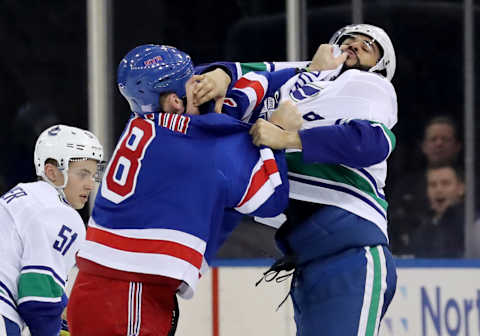
Number two: Why does Cody McLeod keep playing?
Going back to those people who won’t stop whining about every single lineup decision, Quinn does continue to play longtime enforcer Cody McLeod on the fourth line. But, not only does McLeod play, he often has one or two of the team’s important prospects on his line, meaning that they’re essentially playing four on five because of his deficiencies.
However, Quinn’s insistence on keeping the forward in the lineup is logical for a number of reasons. The obvious being that the coach feels that his team needs some sandpaper in the lineup for short spurts to keep the other team on its toes. There is also the fact that the other players on the team respond well to McLeod and his style of play.
The Rangers are slowly shedding the label of a team that is easy to play against. For the longest time, New York simply skated away from the post-whistle scuffles and let the other team walk all over them. With McLeod in the fold, the rest of the lineup just looks more engaged in the game.
Look at who’s getting involved in standing up for themselves in their teammates now. DeAngelo and Skjei have notably gotten involved in scraps in the past several weeks.
As weird as it sounds, having Mcleod in the lineup for eight minutes per night is motivating to the rest of the guys on the team. This is one of those intangible things that are difficult to quantify but the Rangers are playing with heart and winning on more than just skill.
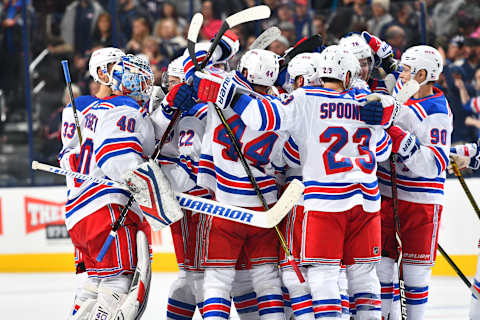
Is this team for real?
The Rangers are somehow in second place in the once fierce Metropolitan Division with 20 points after 18 games. While it is up for debate how sustainable certain aspects of the team’s success are, there’s no denying that the group has played well as of late and found something of a groove. Creating scoring just enough scoring chances and relying on Lundqvist sounds like year’s past.
There is no defined elite talent or major efficiency to the team’s game. New York is scraping by on elbow grease and hard work, something that the modern NHL is shying away from. The team is riding internal energy and self-motivation to compensate for its lack of talent.
The comparison is not exactly direct, but the Vegas Golden Knights rode a similar nobody believes in us mentality all the way to the Stanley Cup final. Now, I’m not saying the Rangers are in a similar position but I’m saying that at least internally, the power of self-motivation can produce great results.
Taking a look at Kevin Shattenkirk's second season in NY. dark. Next
A true sign will come against the New York Islanders on Thursday night. If Quinn can get the team up for and beat the Islanders in the regular season for the first time since opening night 2016, you can consider this team at least in the mix.